Legal Case Study: Analyzing Employment and Consumer Law in the UK
VerifiedAdded on 2023/06/12
|7
|2022
|77
Case Study
AI Summary
This case study provides an analysis of legal issues related to employment and consumer protection in the UK. It examines the provisions of the Employment Act, including work-life balance, unfair dismissal, and discrimination, referencing the Anderson v Thiess Pty Ltd case. Furthermore, it delves into the Consumer Protection Act, focusing on consumer rights, unfair trade practices, and the Consumer Rights Act 2015, using the hypothetical case of Kathy and Sally and the Westminster City Council v Turner Gow case to illustrate key concepts. The analysis concludes that fault was from the side of the buyer as the product was not damaged and neither defective and Kathy used the shoes that was not designed for that purpose. Desklib offers similar solved assignments and study resources for students.
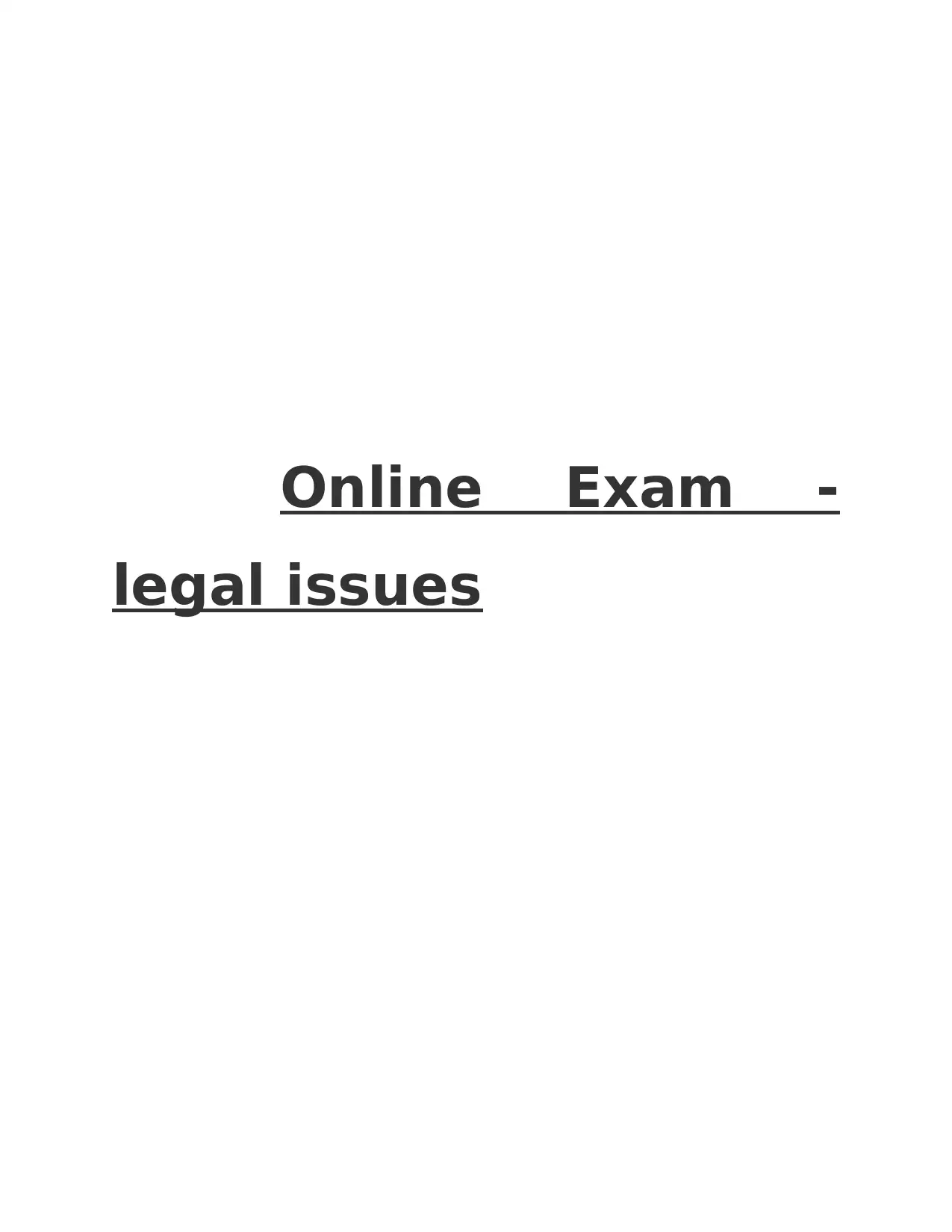
Online Exam -
legal issues
legal issues
Paraphrase This Document
Need a fresh take? Get an instant paraphrase of this document with our AI Paraphraser

Table of Contents
QUESTION-1..................................................................................................................................3
QUESTION-2..................................................................................................................................4
REFERENCES................................................................................................................................7
QUESTION-1..................................................................................................................................3
QUESTION-2..................................................................................................................................4
REFERENCES................................................................................................................................7
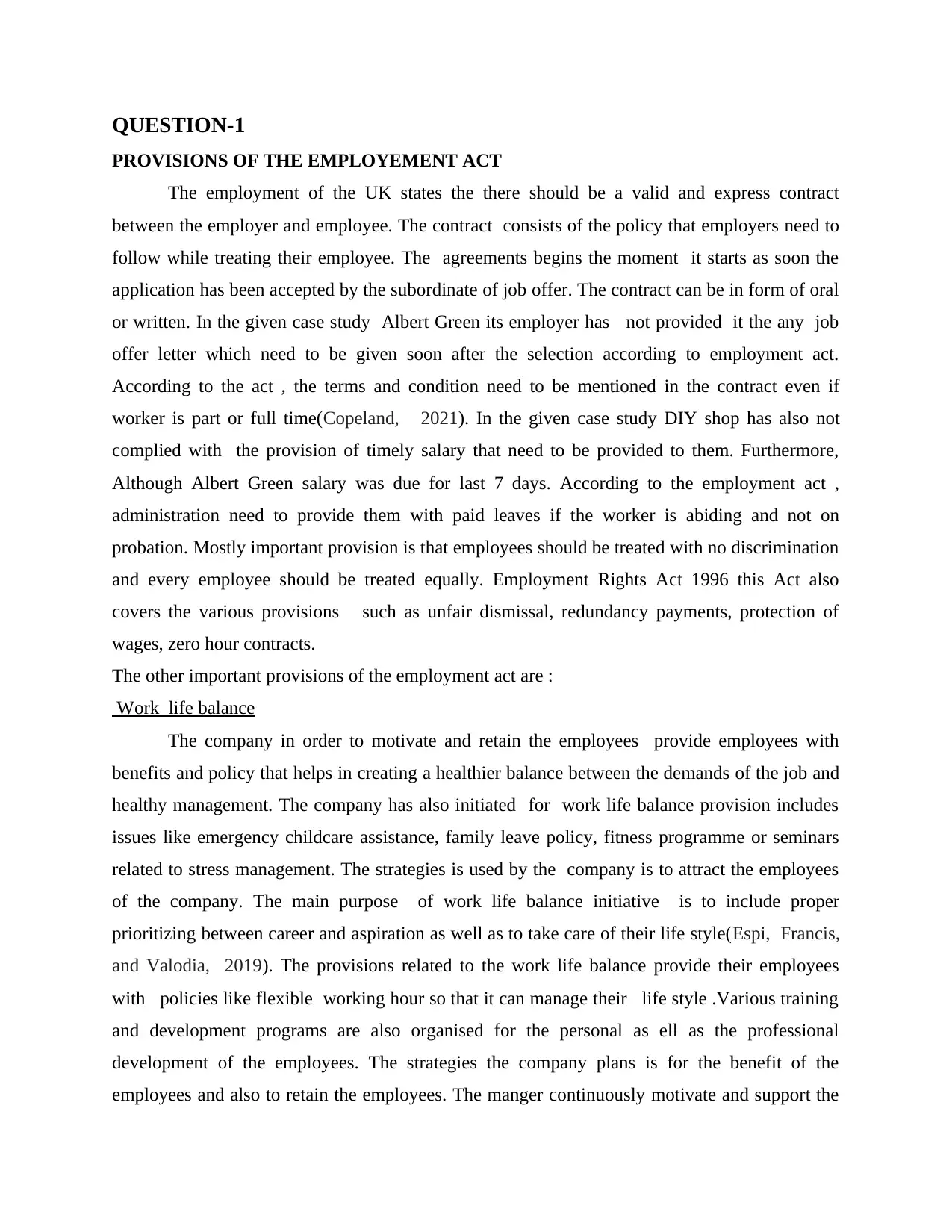
QUESTION-1
PROVISIONS OF THE EMPLOYEMENT ACT
The employment of the UK states the there should be a valid and express contract
between the employer and employee. The contract consists of the policy that employers need to
follow while treating their employee. The agreements begins the moment it starts as soon the
application has been accepted by the subordinate of job offer. The contract can be in form of oral
or written. In the given case study Albert Green its employer has not provided it the any job
offer letter which need to be given soon after the selection according to employment act.
According to the act , the terms and condition need to be mentioned in the contract even if
worker is part or full time(Copeland, 2021). In the given case study DIY shop has also not
complied with the provision of timely salary that need to be provided to them. Furthermore,
Although Albert Green salary was due for last 7 days. According to the employment act ,
administration need to provide them with paid leaves if the worker is abiding and not on
probation. Mostly important provision is that employees should be treated with no discrimination
and every employee should be treated equally. Employment Rights Act 1996 this Act also
covers the various provisions such as unfair dismissal, redundancy payments, protection of
wages, zero hour contracts.
The other important provisions of the employment act are :
Work life balance
The company in order to motivate and retain the employees provide employees with
benefits and policy that helps in creating a healthier balance between the demands of the job and
healthy management. The company has also initiated for work life balance provision includes
issues like emergency childcare assistance, family leave policy, fitness programme or seminars
related to stress management. The strategies is used by the company is to attract the employees
of the company. The main purpose of work life balance initiative is to include proper
prioritizing between career and aspiration as well as to take care of their life style(Espi, Francis,
and Valodia, 2019). The provisions related to the work life balance provide their employees
with policies like flexible working hour so that it can manage their life style .Various training
and development programs are also organised for the personal as ell as the professional
development of the employees. The strategies the company plans is for the benefit of the
employees and also to retain the employees. The manger continuously motivate and support the
PROVISIONS OF THE EMPLOYEMENT ACT
The employment of the UK states the there should be a valid and express contract
between the employer and employee. The contract consists of the policy that employers need to
follow while treating their employee. The agreements begins the moment it starts as soon the
application has been accepted by the subordinate of job offer. The contract can be in form of oral
or written. In the given case study Albert Green its employer has not provided it the any job
offer letter which need to be given soon after the selection according to employment act.
According to the act , the terms and condition need to be mentioned in the contract even if
worker is part or full time(Copeland, 2021). In the given case study DIY shop has also not
complied with the provision of timely salary that need to be provided to them. Furthermore,
Although Albert Green salary was due for last 7 days. According to the employment act ,
administration need to provide them with paid leaves if the worker is abiding and not on
probation. Mostly important provision is that employees should be treated with no discrimination
and every employee should be treated equally. Employment Rights Act 1996 this Act also
covers the various provisions such as unfair dismissal, redundancy payments, protection of
wages, zero hour contracts.
The other important provisions of the employment act are :
Work life balance
The company in order to motivate and retain the employees provide employees with
benefits and policy that helps in creating a healthier balance between the demands of the job and
healthy management. The company has also initiated for work life balance provision includes
issues like emergency childcare assistance, family leave policy, fitness programme or seminars
related to stress management. The strategies is used by the company is to attract the employees
of the company. The main purpose of work life balance initiative is to include proper
prioritizing between career and aspiration as well as to take care of their life style(Espi, Francis,
and Valodia, 2019). The provisions related to the work life balance provide their employees
with policies like flexible working hour so that it can manage their life style .Various training
and development programs are also organised for the personal as ell as the professional
development of the employees. The strategies the company plans is for the benefit of the
employees and also to retain the employees. The manger continuously motivate and support the
⊘ This is a preview!⊘
Do you want full access?
Subscribe today to unlock all pages.

Trusted by 1+ million students worldwide
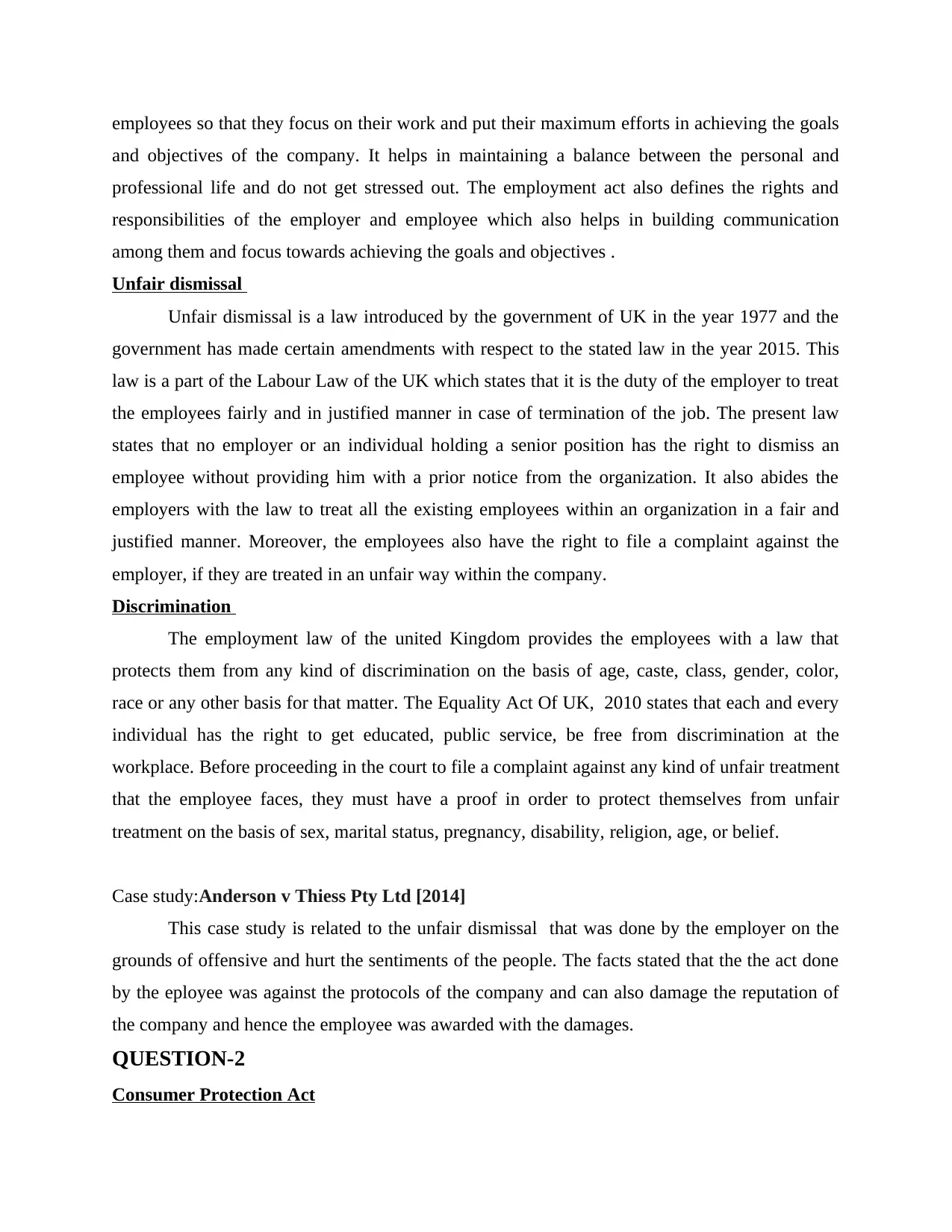
employees so that they focus on their work and put their maximum efforts in achieving the goals
and objectives of the company. It helps in maintaining a balance between the personal and
professional life and do not get stressed out. The employment act also defines the rights and
responsibilities of the employer and employee which also helps in building communication
among them and focus towards achieving the goals and objectives .
Unfair dismissal
Unfair dismissal is a law introduced by the government of UK in the year 1977 and the
government has made certain amendments with respect to the stated law in the year 2015. This
law is a part of the Labour Law of the UK which states that it is the duty of the employer to treat
the employees fairly and in justified manner in case of termination of the job. The present law
states that no employer or an individual holding a senior position has the right to dismiss an
employee without providing him with a prior notice from the organization. It also abides the
employers with the law to treat all the existing employees within an organization in a fair and
justified manner. Moreover, the employees also have the right to file a complaint against the
employer, if they are treated in an unfair way within the company.
Discrimination
The employment law of the united Kingdom provides the employees with a law that
protects them from any kind of discrimination on the basis of age, caste, class, gender, color,
race or any other basis for that matter. The Equality Act Of UK, 2010 states that each and every
individual has the right to get educated, public service, be free from discrimination at the
workplace. Before proceeding in the court to file a complaint against any kind of unfair treatment
that the employee faces, they must have a proof in order to protect themselves from unfair
treatment on the basis of sex, marital status, pregnancy, disability, religion, age, or belief.
Case study:Anderson v Thiess Pty Ltd [2014]
This case study is related to the unfair dismissal that was done by the employer on the
grounds of offensive and hurt the sentiments of the people. The facts stated that the the act done
by the eployee was against the protocols of the company and can also damage the reputation of
the company and hence the employee was awarded with the damages.
QUESTION-2
Consumer Protection Act
and objectives of the company. It helps in maintaining a balance between the personal and
professional life and do not get stressed out. The employment act also defines the rights and
responsibilities of the employer and employee which also helps in building communication
among them and focus towards achieving the goals and objectives .
Unfair dismissal
Unfair dismissal is a law introduced by the government of UK in the year 1977 and the
government has made certain amendments with respect to the stated law in the year 2015. This
law is a part of the Labour Law of the UK which states that it is the duty of the employer to treat
the employees fairly and in justified manner in case of termination of the job. The present law
states that no employer or an individual holding a senior position has the right to dismiss an
employee without providing him with a prior notice from the organization. It also abides the
employers with the law to treat all the existing employees within an organization in a fair and
justified manner. Moreover, the employees also have the right to file a complaint against the
employer, if they are treated in an unfair way within the company.
Discrimination
The employment law of the united Kingdom provides the employees with a law that
protects them from any kind of discrimination on the basis of age, caste, class, gender, color,
race or any other basis for that matter. The Equality Act Of UK, 2010 states that each and every
individual has the right to get educated, public service, be free from discrimination at the
workplace. Before proceeding in the court to file a complaint against any kind of unfair treatment
that the employee faces, they must have a proof in order to protect themselves from unfair
treatment on the basis of sex, marital status, pregnancy, disability, religion, age, or belief.
Case study:Anderson v Thiess Pty Ltd [2014]
This case study is related to the unfair dismissal that was done by the employer on the
grounds of offensive and hurt the sentiments of the people. The facts stated that the the act done
by the eployee was against the protocols of the company and can also damage the reputation of
the company and hence the employee was awarded with the damages.
QUESTION-2
Consumer Protection Act
Paraphrase This Document
Need a fresh take? Get an instant paraphrase of this document with our AI Paraphraser
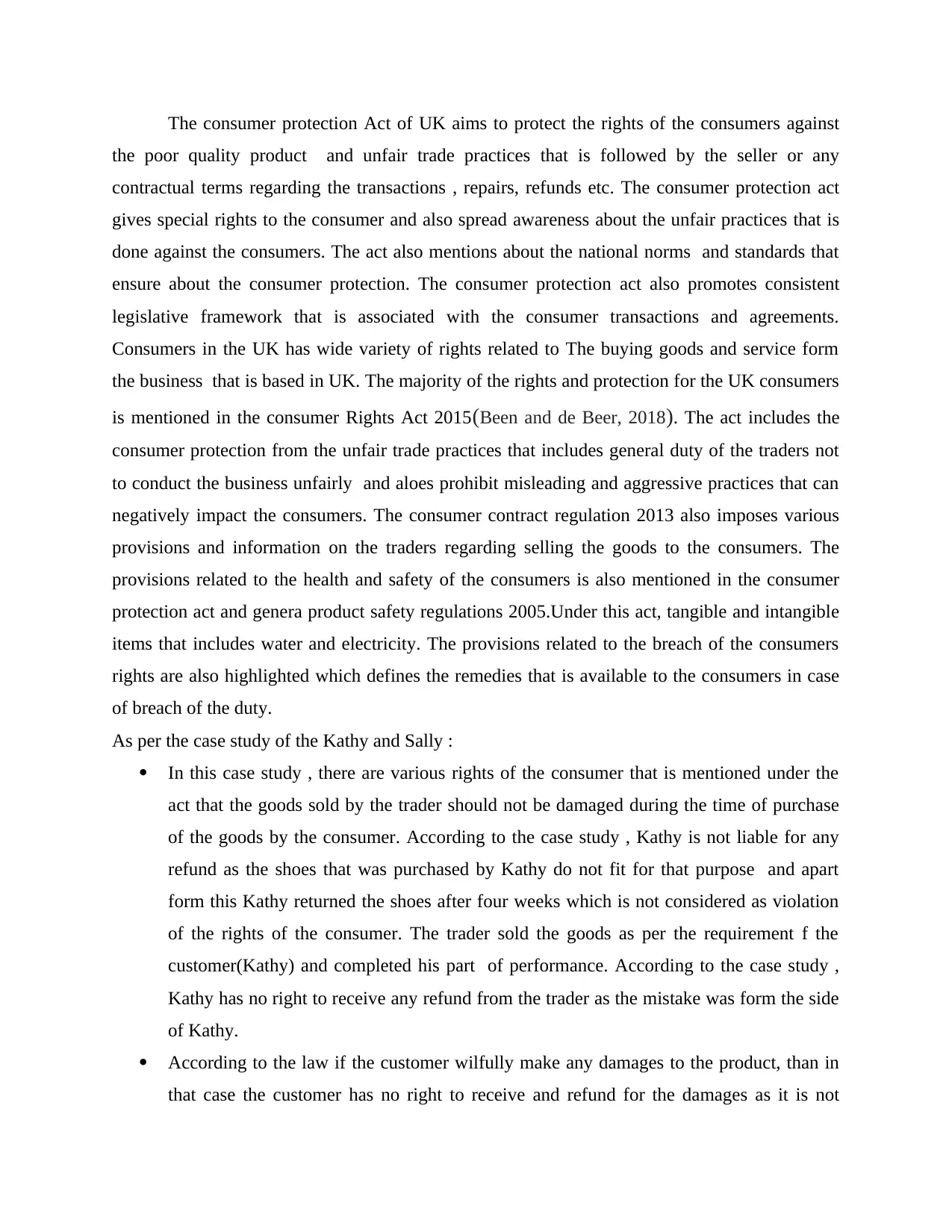
The consumer protection Act of UK aims to protect the rights of the consumers against
the poor quality product and unfair trade practices that is followed by the seller or any
contractual terms regarding the transactions , repairs, refunds etc. The consumer protection act
gives special rights to the consumer and also spread awareness about the unfair practices that is
done against the consumers. The act also mentions about the national norms and standards that
ensure about the consumer protection. The consumer protection act also promotes consistent
legislative framework that is associated with the consumer transactions and agreements.
Consumers in the UK has wide variety of rights related to The buying goods and service form
the business that is based in UK. The majority of the rights and protection for the UK consumers
is mentioned in the consumer Rights Act 2015(Been and de Beer, 2018). The act includes the
consumer protection from the unfair trade practices that includes general duty of the traders not
to conduct the business unfairly and aloes prohibit misleading and aggressive practices that can
negatively impact the consumers. The consumer contract regulation 2013 also imposes various
provisions and information on the traders regarding selling the goods to the consumers. The
provisions related to the health and safety of the consumers is also mentioned in the consumer
protection act and genera product safety regulations 2005.Under this act, tangible and intangible
items that includes water and electricity. The provisions related to the breach of the consumers
rights are also highlighted which defines the remedies that is available to the consumers in case
of breach of the duty.
As per the case study of the Kathy and Sally :
In this case study , there are various rights of the consumer that is mentioned under the
act that the goods sold by the trader should not be damaged during the time of purchase
of the goods by the consumer. According to the case study , Kathy is not liable for any
refund as the shoes that was purchased by Kathy do not fit for that purpose and apart
form this Kathy returned the shoes after four weeks which is not considered as violation
of the rights of the consumer. The trader sold the goods as per the requirement f the
customer(Kathy) and completed his part of performance. According to the case study ,
Kathy has no right to receive any refund from the trader as the mistake was form the side
of Kathy.
According to the law if the customer wilfully make any damages to the product, than in
that case the customer has no right to receive and refund for the damages as it is not
the poor quality product and unfair trade practices that is followed by the seller or any
contractual terms regarding the transactions , repairs, refunds etc. The consumer protection act
gives special rights to the consumer and also spread awareness about the unfair practices that is
done against the consumers. The act also mentions about the national norms and standards that
ensure about the consumer protection. The consumer protection act also promotes consistent
legislative framework that is associated with the consumer transactions and agreements.
Consumers in the UK has wide variety of rights related to The buying goods and service form
the business that is based in UK. The majority of the rights and protection for the UK consumers
is mentioned in the consumer Rights Act 2015(Been and de Beer, 2018). The act includes the
consumer protection from the unfair trade practices that includes general duty of the traders not
to conduct the business unfairly and aloes prohibit misleading and aggressive practices that can
negatively impact the consumers. The consumer contract regulation 2013 also imposes various
provisions and information on the traders regarding selling the goods to the consumers. The
provisions related to the health and safety of the consumers is also mentioned in the consumer
protection act and genera product safety regulations 2005.Under this act, tangible and intangible
items that includes water and electricity. The provisions related to the breach of the consumers
rights are also highlighted which defines the remedies that is available to the consumers in case
of breach of the duty.
As per the case study of the Kathy and Sally :
In this case study , there are various rights of the consumer that is mentioned under the
act that the goods sold by the trader should not be damaged during the time of purchase
of the goods by the consumer. According to the case study , Kathy is not liable for any
refund as the shoes that was purchased by Kathy do not fit for that purpose and apart
form this Kathy returned the shoes after four weeks which is not considered as violation
of the rights of the consumer. The trader sold the goods as per the requirement f the
customer(Kathy) and completed his part of performance. According to the case study ,
Kathy has no right to receive any refund from the trader as the mistake was form the side
of Kathy.
According to the law if the customer wilfully make any damages to the product, than in
that case the customer has no right to receive and refund for the damages as it is not
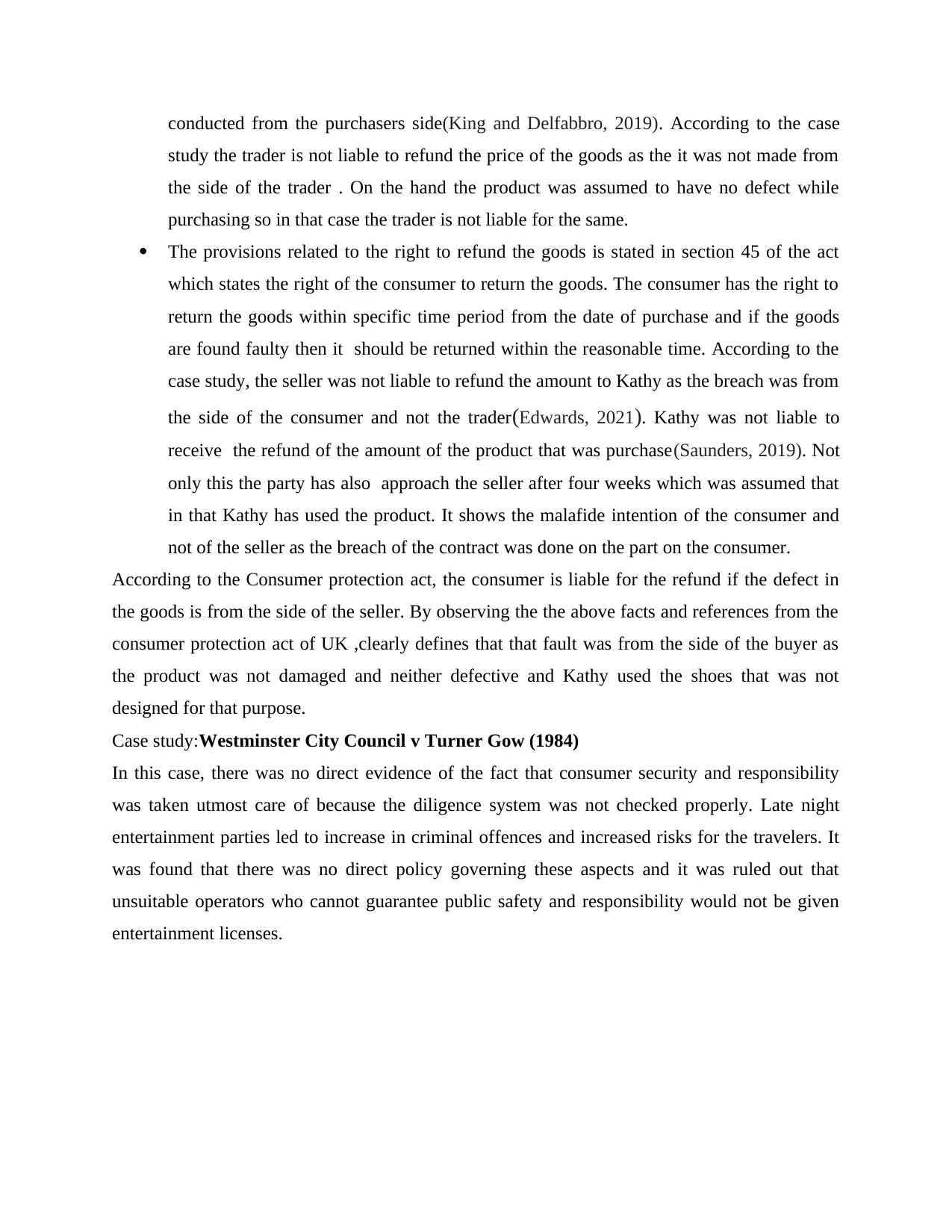
conducted from the purchasers side(King and Delfabbro, 2019). According to the case
study the trader is not liable to refund the price of the goods as the it was not made from
the side of the trader . On the hand the product was assumed to have no defect while
purchasing so in that case the trader is not liable for the same.
The provisions related to the right to refund the goods is stated in section 45 of the act
which states the right of the consumer to return the goods. The consumer has the right to
return the goods within specific time period from the date of purchase and if the goods
are found faulty then it should be returned within the reasonable time. According to the
case study, the seller was not liable to refund the amount to Kathy as the breach was from
the side of the consumer and not the trader(Edwards, 2021). Kathy was not liable to
receive the refund of the amount of the product that was purchase(Saunders, 2019). Not
only this the party has also approach the seller after four weeks which was assumed that
in that Kathy has used the product. It shows the malafide intention of the consumer and
not of the seller as the breach of the contract was done on the part on the consumer.
According to the Consumer protection act, the consumer is liable for the refund if the defect in
the goods is from the side of the seller. By observing the the above facts and references from the
consumer protection act of UK ,clearly defines that that fault was from the side of the buyer as
the product was not damaged and neither defective and Kathy used the shoes that was not
designed for that purpose.
Case study:Westminster City Council v Turner Gow (1984)
In this case, there was no direct evidence of the fact that consumer security and responsibility
was taken utmost care of because the diligence system was not checked properly. Late night
entertainment parties led to increase in criminal offences and increased risks for the travelers. It
was found that there was no direct policy governing these aspects and it was ruled out that
unsuitable operators who cannot guarantee public safety and responsibility would not be given
entertainment licenses.
study the trader is not liable to refund the price of the goods as the it was not made from
the side of the trader . On the hand the product was assumed to have no defect while
purchasing so in that case the trader is not liable for the same.
The provisions related to the right to refund the goods is stated in section 45 of the act
which states the right of the consumer to return the goods. The consumer has the right to
return the goods within specific time period from the date of purchase and if the goods
are found faulty then it should be returned within the reasonable time. According to the
case study, the seller was not liable to refund the amount to Kathy as the breach was from
the side of the consumer and not the trader(Edwards, 2021). Kathy was not liable to
receive the refund of the amount of the product that was purchase(Saunders, 2019). Not
only this the party has also approach the seller after four weeks which was assumed that
in that Kathy has used the product. It shows the malafide intention of the consumer and
not of the seller as the breach of the contract was done on the part on the consumer.
According to the Consumer protection act, the consumer is liable for the refund if the defect in
the goods is from the side of the seller. By observing the the above facts and references from the
consumer protection act of UK ,clearly defines that that fault was from the side of the buyer as
the product was not damaged and neither defective and Kathy used the shoes that was not
designed for that purpose.
Case study:Westminster City Council v Turner Gow (1984)
In this case, there was no direct evidence of the fact that consumer security and responsibility
was taken utmost care of because the diligence system was not checked properly. Late night
entertainment parties led to increase in criminal offences and increased risks for the travelers. It
was found that there was no direct policy governing these aspects and it was ruled out that
unsuitable operators who cannot guarantee public safety and responsibility would not be given
entertainment licenses.
⊘ This is a preview!⊘
Do you want full access?
Subscribe today to unlock all pages.

Trusted by 1+ million students worldwide
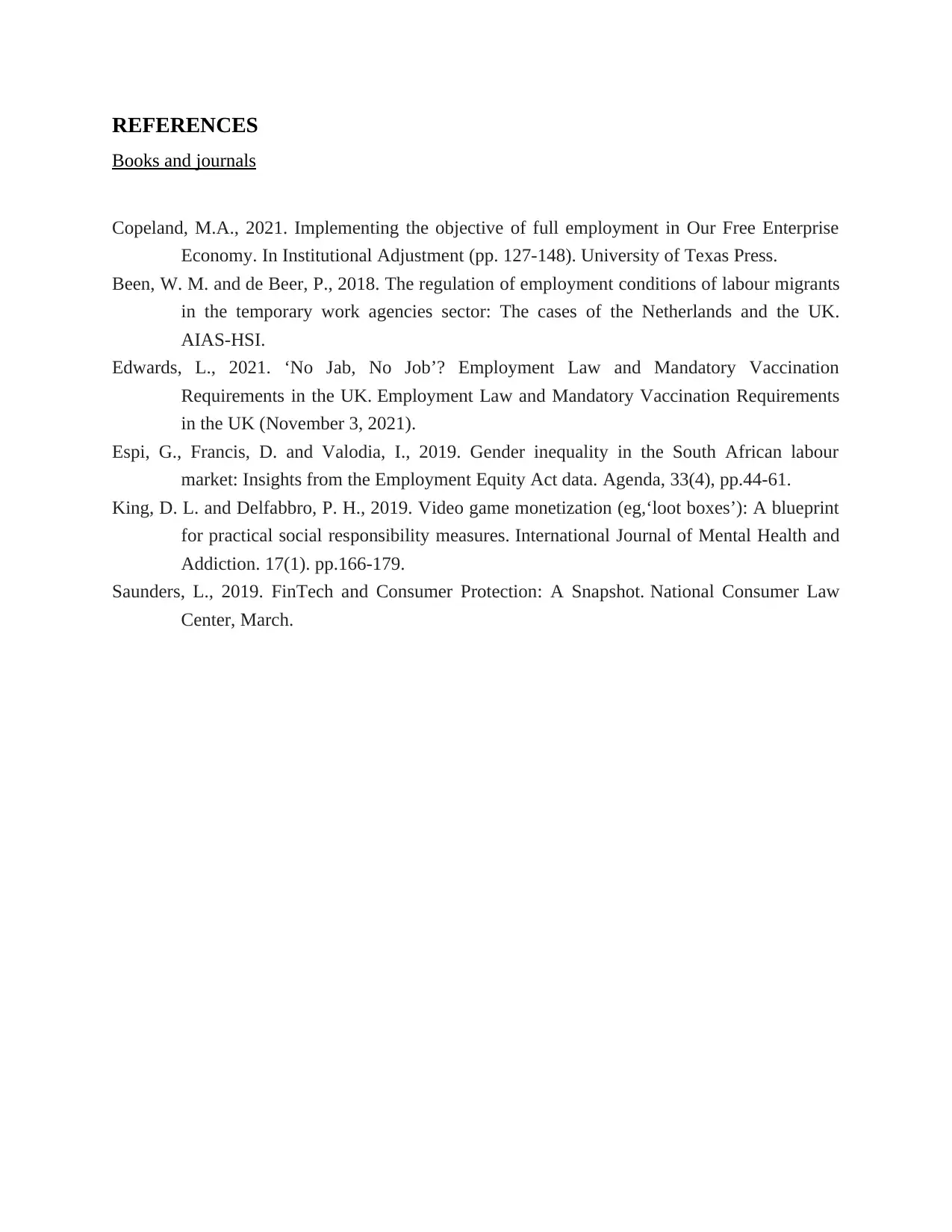
REFERENCES
Books and journals
Copeland, M.A., 2021. Implementing the objective of full employment in Our Free Enterprise
Economy. In Institutional Adjustment (pp. 127-148). University of Texas Press.
Been, W. M. and de Beer, P., 2018. The regulation of employment conditions of labour migrants
in the temporary work agencies sector: The cases of the Netherlands and the UK.
AIAS-HSI.
Edwards, L., 2021. ‘No Jab, No Job’? Employment Law and Mandatory Vaccination
Requirements in the UK. Employment Law and Mandatory Vaccination Requirements
in the UK (November 3, 2021).
Espi, G., Francis, D. and Valodia, I., 2019. Gender inequality in the South African labour
market: Insights from the Employment Equity Act data. Agenda, 33(4), pp.44-61.
King, D. L. and Delfabbro, P. H., 2019. Video game monetization (eg,‘loot boxes’): A blueprint
for practical social responsibility measures. International Journal of Mental Health and
Addiction. 17(1). pp.166-179.
Saunders, L., 2019. FinTech and Consumer Protection: A Snapshot. National Consumer Law
Center, March.
Books and journals
Copeland, M.A., 2021. Implementing the objective of full employment in Our Free Enterprise
Economy. In Institutional Adjustment (pp. 127-148). University of Texas Press.
Been, W. M. and de Beer, P., 2018. The regulation of employment conditions of labour migrants
in the temporary work agencies sector: The cases of the Netherlands and the UK.
AIAS-HSI.
Edwards, L., 2021. ‘No Jab, No Job’? Employment Law and Mandatory Vaccination
Requirements in the UK. Employment Law and Mandatory Vaccination Requirements
in the UK (November 3, 2021).
Espi, G., Francis, D. and Valodia, I., 2019. Gender inequality in the South African labour
market: Insights from the Employment Equity Act data. Agenda, 33(4), pp.44-61.
King, D. L. and Delfabbro, P. H., 2019. Video game monetization (eg,‘loot boxes’): A blueprint
for practical social responsibility measures. International Journal of Mental Health and
Addiction. 17(1). pp.166-179.
Saunders, L., 2019. FinTech and Consumer Protection: A Snapshot. National Consumer Law
Center, March.
1 out of 7
Related Documents
Your All-in-One AI-Powered Toolkit for Academic Success.
+13062052269
info@desklib.com
Available 24*7 on WhatsApp / Email
![[object Object]](/_next/static/media/star-bottom.7253800d.svg)
Unlock your academic potential
Copyright © 2020–2026 A2Z Services. All Rights Reserved. Developed and managed by ZUCOL.


